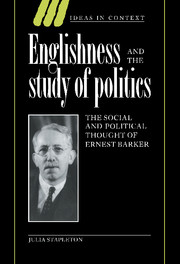Book contents
- Frontmatter
- Contents
- Acknowledgements
- Introduction: The ‘national character’ of Barker's thought
- 1 Lancashire, Idealism, and Whiggism: the making of an English political scientist
- 2 The polis, law, and the development of political studies at Oxford, 1900–1920
- 3 Society and the state in the English national past: the lure of Pluralism
- 4 Statehood, nationhood, and internationalism: English political theory and the First World War
- 5 Education and national character: the milieu of King's College London
- 6 ‘Continental’ political science and the Cambridge Chair
- 7 Traditions of civility: the construction of Englishness in the Second World War and beyond
- 8 The expansion of Englishness: the Books Commission, Europe, and the Commonwealth
- Conclusion: A late-Victorian liberal-conservative
- Select Bibliography
- Index
- Ideas in Context
Introduction: The ‘national character’ of Barker's thought
Published online by Cambridge University Press: 11 September 2009
- Frontmatter
- Contents
- Acknowledgements
- Introduction: The ‘national character’ of Barker's thought
- 1 Lancashire, Idealism, and Whiggism: the making of an English political scientist
- 2 The polis, law, and the development of political studies at Oxford, 1900–1920
- 3 Society and the state in the English national past: the lure of Pluralism
- 4 Statehood, nationhood, and internationalism: English political theory and the First World War
- 5 Education and national character: the milieu of King's College London
- 6 ‘Continental’ political science and the Cambridge Chair
- 7 Traditions of civility: the construction of Englishness in the Second World War and beyond
- 8 The expansion of Englishness: the Books Commission, Europe, and the Commonwealth
- Conclusion: A late-Victorian liberal-conservative
- Select Bibliography
- Index
- Ideas in Context
Summary
ENGLISHNESS AND POLITICAL SCIENCE
On 24 May 1948, Ernest Barker (1874–1960) dined at the Athenaeum with Sir Edward Bridges, Permanent Secretary of the Treasury and Official Head of the Civil Service. He was there to discuss how Bridges might resolve a feud which had arisen between Bridges and the Foreign Office over that part of Bridges' title which referred to his ‘headship’ of the Civil Service. Bridges had inherited this role from one of his predecessors, Sir Warren Fisher, who had revived its association with the Treasury in 1919. But the dust of the constitutional wrangling at that time had never settled, a certain Sir Walford Selby in the Foreign Office persistently alleging that the Treasury's possession of the headship had effectively ‘paralysed’ his department, and wreaked much other havoc in British government besides. The latest figure whom Selby had sought to recruit to his cause was Barker, evidently unaware of Barker's friendship with Bridges.
Barker offered a possible solution to Bridges' difficulties in a correspondence which followed the dinner. With his usual unfailing courtesy and scholarly command, he informed Bridges of a similar problem which had confronted Elizabeth I. Upon her accession, she had been forced to find an alternative term for the Caput – or headship – of the Church of England in the monarch's title, this having lapsed during Mary's reign. Elizabeth's solution was simple.
- Type
- Chapter
- Information
- Englishness and the Study of PoliticsThe Social and Political Thought of Ernest Barker, pp. 1 - 19Publisher: Cambridge University PressPrint publication year: 1994
- 1
- Cited by



